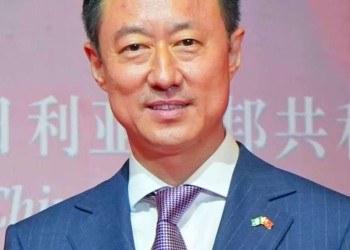Foreign policy experts have advised the incoming administration to sustain and strengthen the robust bilateral relationship between Nigeria and the People’s Republic of China.
They disclosed this in separate interviews with our correspondent ahead of the May 29 inauguration of Asiwaju Bola Ahmed Tinubu as Nigeria’s 16th president.
Dr Tochukwu Okeke, a senior lecturer at the University of Abuja said the Tinubu administration should engage the Chinese government in the areas of agriculture and food security.
His words, “Nigeria has a large expanse of land that is uncultivated, a land that can feed the whole of West Africa. Don’t forget that Nigeria is a regional power, a country that is strategically located between the Sahara Desert in the north and the Atlantic Ocean in the south, a country that has two major water bodies running through it, so the idea of irrigation technology can be imported to help Nigeria introduce a system of in and out of season production. This happens in China, there is no time you go to China that agricultural activities are not going on because they have the land, the people and the technology.
“I believe this is an area that Nigeria has not fully explored and if the Tinubu administration can partner with China in the area of irrigation agriculture, Nigeria will not just be providing food for her citizens, it will be providing food and raw materials for West African economies and by so doing, create jobs and millions of other value chains just by pursuing this strand of foreign policy objective.”
For Mr Charles Onunaiju, Director, Center for China Studies, the incoming administration should engage China from the framework of policy, adding that China-Nigeria relations should be made more comprehensive and strategic.
“I believe that China-Nigeria relations should be made more comprehensive, should be made more strategic. The Nigerian side should engage more from the framework of policy,” he said.
“China says it will open its market to 300 billion worth of agricultural produce from Africa and there is nothing the Chinese want in their market that Nigeria doesn’t have in abundance. We need to reach out, activate our local mechanism to maximize the opportunity of access to the Chinese market.”
Dr Suleman Barnabas, a lecturer at Base University in Abuja believes that the Tinubu administration should partner with the Chinese government in the areas of industrialization and transfer of knowledge.
“I think China needs to build more industries in Nigeria and by so doing, create more jobs for Nigerians. I also want to see an increase in the exchange of knowledge between China and Nigeria,” he said.
“We have no business exporting some of the things we export. Let China come and build more industries so that Nigerians can be involved in the process of manufacturing. I want the Chinese to train young Nigerians in the area of technology so that we can work towards a self-reliant, win-win relationship and not that of dependence.”
On his part, Dr Olalekan Babatunde, Research Fellow of the Institute for Peace and Conflict Resolution wants the incoming administration to prioritise power generation in its investment deals with China.
His words, “We are still having a challenge with the production and distribution of electricity. I want to see the Chinese government scale up their investment in solar energy in Nigeria, so people can have access to cheaper solar energy to power their businesses.
“Most businesses in Nigeria run on generators paying huge amounts on diesel and petrol. If we have access to solar energy everywhere, people can afford to have stable electricity for their daily needs. Businessmen will be able to do more, make profits and pay their taxes.”
Since the establishment of diplomatic ties in 1970, Nigeria and China have enjoyed a mutually beneficial trade relationship leading to the establishment of industries and the provision of critical infrastructures especially in the transport sector.













































